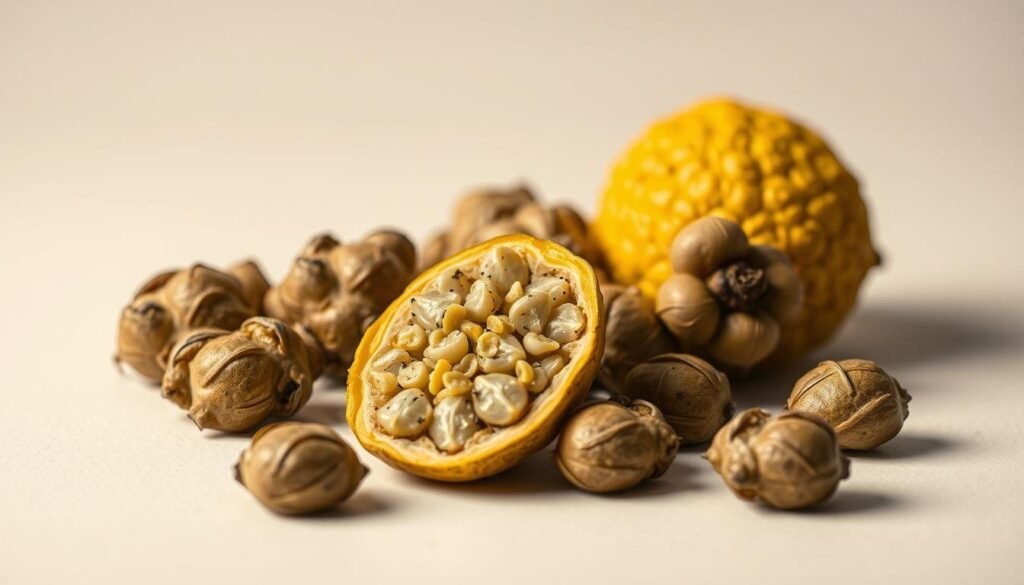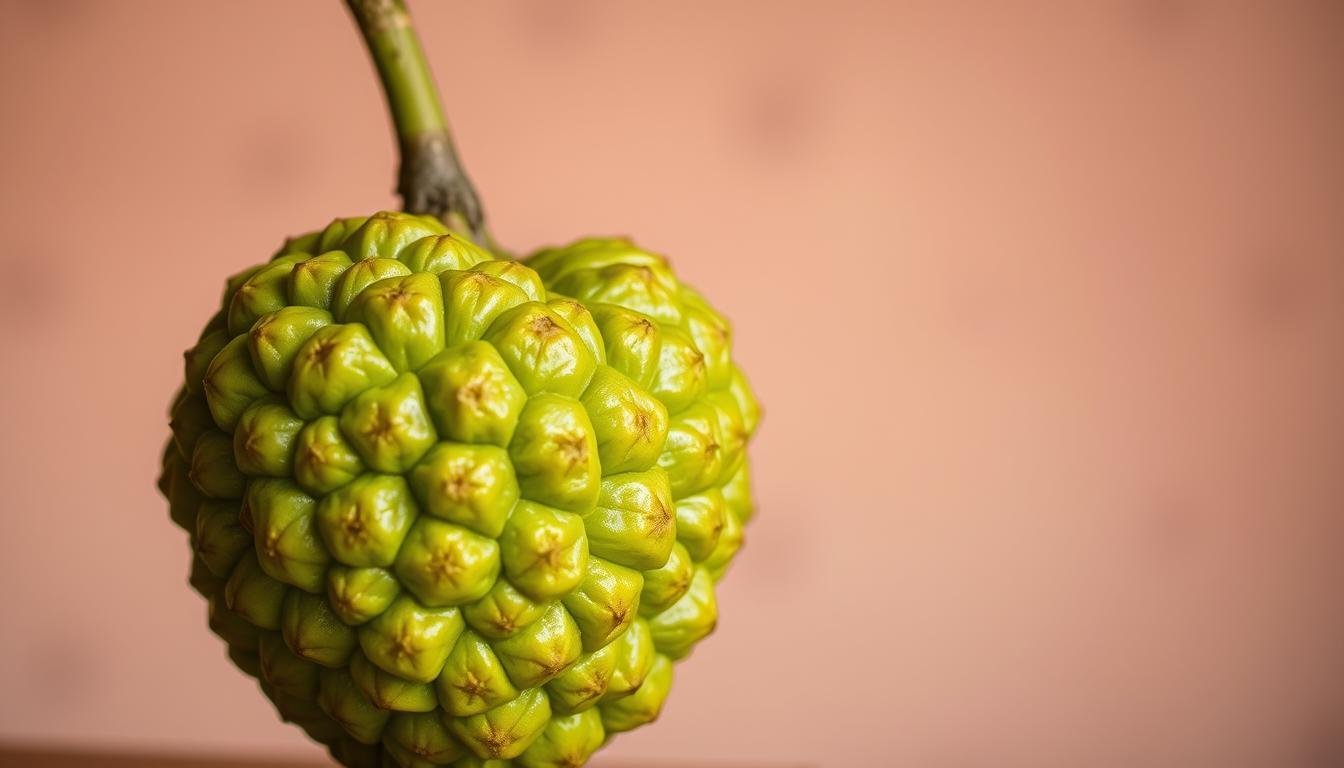Last updated on August 21st, 2025 at 02:46 pm
Can You Eat the Seeds of Soursop? The soursop fruit is becoming more popular for its unique taste and health benefits. Many wonder if its seeds are safe to eat.
Knowing the soursop nutritional profile, including the seeds, is key. This helps us understand their safety and benefits. While people enjoy the fruit, the seeds are often questioned for their risks.
Learning about soursop seeds is important for your diet. Their nutritional value and health effects are crucial to consider.
Contents
- 1 What is Soursop and Its Nutritional Profile
- 2 Can You Eat the Seeds of Soursop?
- 3 Potential Health Benefits of Soursop Seeds
- 4 Risks and Side Effects of Consuming Soursop Seeds
- 5 Safe Ways to Use Soursop Seeds
- 6 Conclusion: Can You Eat the Seeds of Soursop?
- 7 FAQ
- 7.1 Are soursop seeds safe to eat?
- 7.2 What are the potential health benefits of soursop seeds?
- 7.3 How can I prepare soursop seeds for consumption?
- 7.4 Can I eat soursop seeds raw?
- 7.5 Are soursop seeds a good source of nutrients?
- 7.6 Can I use soursop seeds as a medicine?
- 7.7 How much soursop seeds can I safely consume?
What is Soursop and Its Nutritional Profile
Soursop, also known as guanabana, is a fruit packed with nutrients. It’s been a favorite in tropical areas for centuries. If you’re looking for healthy exotic fruits, soursop is a great pick.
This fruit is full of vitamins, minerals, and antioxidants. It’s a favorite among those who care about their health. Soursop is rich in vitamin C, potassium, and fiber. You can find it fresh, frozen, or as a supplement, making it easy to add to your meals.
- Vitamin C: Essential for immune function and overall health.
- Potassium: Helps regulate blood pressure and supports heart health.
- Fiber: Aids in digestion and promotes a healthy gut.
- Antioxidants: Protects cells from damage and reduces inflammation.
Knowing about soursop’s nutritional benefits can help you choose better foods. Its unique taste and health perks make it popular for those wanting to eat better.
Soursop is a great addition to a healthy diet. You can eat it fresh, blend it into smoothies, or take it as a supplement. Exploring exotic fruits, soursop is a top choice for its health benefits.
Can You Eat the Seeds of Soursop?
When you enjoy soursop, you might wonder if the seeds are safe to eat. People often throw away the seeds because they’re unsure if they’re edible. But, some think these seeds could be good for your health, so it’s important to know the good and bad sides.
Consuming soursop seeds safely means knowing the risks and how to avoid them. The pulp of soursop is safe for most people, but the seeds have compounds that could be dangerous if not handled right.
To figure out if you can eat soursop seeds, you need to learn how to prepare them safely. This includes finding out how to process the seeds to reduce any bad effects. Being informed helps you make a choice that’s right for your health and safety.
Potential Health Benefits of Soursop Seeds
Looking into soursop seeds shows they might have many health perks. They are thought to have compounds that could help in several ways. These include having antioxidant properties.
Antioxidant Properties of Soursop Seeds
Soursop seeds might protect the body from harm. They could fight off free radicals, which damage cells and lead to diseases. Their antioxidants might help reduce stress and improve health.
Soursop seeds are also being studied for their potential anti-inflammatory and antimicrobial effects. Some research shows they could boost the immune system and fight infections.
- Soursop seeds may help in reducing inflammation.
- The antioxidant properties could contribute to overall well-being.
- Potential antimicrobial effects may aid in fighting infections.
While soursop seeds seem promising, talk to a doctor before using them for health. More studies are needed to know their full effects on humans.
Thinking about adding soursop seeds to your routine? Remember, results can differ. It’s key to consider the benefits and risks. Always talk to a healthcare provider before starting.
Risks and Side Effects of Consuming Soursop Seeds
Soursop seeds can be risky because they have harmful substances. While soursop is good for health, its seeds might be toxic.
Research shows soursop seeds have compounds that can harm you, especially if you eat too much. It’s crucial to be aware of these potential risks to make informed decisions about using soursop seeds.

Soursop seeds have neurotoxins and other harmful compounds. Eating these seeds can lead to:
- Nervous system disorders due to the presence of neurotoxins
- Potential liver or kidney damage from excessive consumption
- Allergic reactions in sensitive individuals
To avoid risks, eat soursop seeds in small amounts. Also, using the right preparation methods can help.
Precautions and Recommendations
If you’re thinking about eating soursop seeds, do this:
- Consult with a healthcare professional to discuss potential risks and benefits
- Start with small amounts to monitor for any adverse reactions
- Be aware of the source and quality of the soursop seeds to minimize exposure to contaminants
Being informed and careful helps you make the right choice about soursop seeds.
Safe Ways to Use Soursop Seeds
You can enjoy soursop seeds safely by learning how to use them right. It’s important to prepare them carefully to avoid risks. Roasting or grinding them can make them taste better and might reduce their toxicity.
To roast soursop seeds, spread them on a baking sheet. Heat them in the oven at 250°F (120°C) for 10-15 minutes. They should smell fragrant and be lightly browned.
Grinding soursop seeds is another way to use them. You can turn them into a powder and use it as a spice. Or add it to smoothies and other recipes. But start with a small amount to see how your body reacts.
Precautions and Consultations
Before eating soursop seeds, roasted or ground, talk to a healthcare professional. They can give advice based on your health and any medicines you take.
| Preparation Method | Description | Precautions |
|---|---|---|
| Roasting | Spread seeds on a baking sheet and roast at 250°F (120°C) for 10-15 minutes. | Monitor temperature and time to avoid burning. |
| Grinding | Grind seeds into a powder for use as a spice or in recipes. | Start with a small amount to check for adverse reactions. |
By following these safe steps and talking to healthcare professionals, you can enjoy soursop seeds safely. Always be careful when trying new foods, especially those that might be toxic.
Conclusion: Can You Eat the Seeds of Soursop?
Exploring soursop has shown you that eating its seeds is not a simple yes or no. Soursop seeds might have health perks, but you should be careful.
Knowing what soursop seeds are and their possible effects helps you decide if they’re right for you. To safely eat soursop, make sure to prepare its seeds correctly, as we’ve talked about before.
As you try new and exotic fruits, always put your health and safety first. With some knowledge and caution, you can enjoy the good things soursop and other unusual foods have to offer.
See Also: Can You Eat the Seeds of Star Fruit?
FAQ
Are soursop seeds safe to eat?
Some think soursop seeds might be good for you. But, eating too much could be harmful.
What are the potential health benefits of soursop seeds?
Soursop seeds might have antioxidants. They could also fight inflammation and infections.
How can I prepare soursop seeds for consumption?
Roasting or grinding the seeds might make them taste better. It could also lessen their harmful effects.
Can I eat soursop seeds raw?
No, it’s best not to eat soursop seeds raw. They might cause problems.
Are soursop seeds a good source of nutrients?
Soursop seeds aren’t packed with nutrients. But, they do have some compounds that might be good for you.
Can I use soursop seeds as a medicine?
Some believe soursop seeds can be medicinal. But, always talk to a doctor before using them.
How much soursop seeds can I safely consume?
Eating soursop seeds in small amounts is safest. Too much can be bad.

Hello, I am Bellamy George, a certified nutritionist and food safety specialist from Springfield, IL. With a degree in Food Science, I share research-backed insights on edible foods, seeds, and seafood for safe, informed eating.

